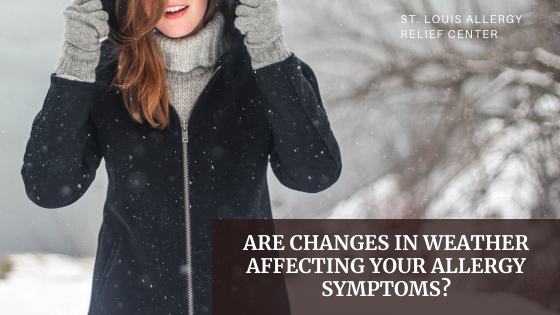Are Changes in Weather Affecting Your Allergy Symptoms?

When most people think of common allergy symptoms like nasal congestion, runny nose, sneezing, and headaches, they think these are all allergic reactions to something. However, sometimes these symptoms are not caused by allergies, but are a sensitivity reaction – specifically to the weather. Changes in the weather, such as temperature changes, barometric pressure fluctuations, and even the change of the seasons can produce allergy-like symptoms, including all the common ones like headaches, migraines, and body pain. Let this article be your guide in learning all about how weather affects your allergies.
The Weather and How it Can Affect Our Bodies
Why do changes in temperature, pressure, or other weather conditions, cause allergy symptoms and/or pain in some people? The answer is due to inflammation in various body tissues affected by changes in weather.
To explain this, let’s look at a common example. When there is a weather change, such as a rainstorm or a humid day, many people notice they become congested or develop headaches or other pain. This is due to sensitive nerve endings, especially in the nasal passages but also in other areas of the body, overreacting to atmospheric pressure, leading to the swelling of blood vessels. This, in turn, leads to congestion, runny nose, postnasal drip and, for many people, headaches and migraines or even arthritis-like body pains.
Simply put, all changes in weather and temperature are accompanied by changes in barometric pressure. And, for some people, barometric pressure changes produce inflamed and swollen blood vessels. This inflammatory syndrome can affect anyone when their immune system incorrectly reacts to barometric pressure change as if the pressure change were something harmful to the body. When that happens, our immune system will try to protect us, and we experience that “protection” as symptoms.
Can You Be Allergic to The Weather?
You might have noticed that when the weather suddenly changes, going from a sunny to a rainy or snowy day, you get congested or perhaps develop a headache or migraine or other body pain. If you have seasonal allergies you already know that each season brings specific allergens that can trigger symptoms, like sneezing, runny noses, and wheezing. Certain allergens thrive in certain weather conditions. For example, mold grows in the winter, hay fever is common in the summer, and pollen fills the spring and fall air.
Interestingly enough, the nature of weather within seasons can also affect how bad your allergic reactions will be. For example, wet winters enable trees and plants to produce more pollen, which then worsens pollen allergies in the spring and summer. Studies show that global warming and climate change are adversely affecting allergy and asthma levels. The dangerous combination of ozone pollution with rising pollen spore counts are also major sources for the dramatic increase in the number of allergy and asthma sufferers.
However, sometimes it is just the weather itself that gives us allergy-like symptoms. Changes in temperature and humidity can cause swelling within the sinus membranes of the nose and head, which in turn triggers sinus symptoms. These types of sinus symptoms are generally referred to as non-allergic rhinitis. In other words, you may not be having a true allergic reaction, even though it feels like one. So no, you are not really allergic to the weather; you have just developed a sensitivity to the changes the weather produces in your body.
Tips to Relieve Weather Related Symptoms
There is no cure for weather related inflammation, but there is hope as well as a way to control the symptoms. Unfortunately, immunotherapy, allergy shots, or over-the-counter allergy medications do not work, as patients do not have an allergy. You can’t avoid the weather, but some general measures to reduce your symptoms during weather changes can include:
- Before turning on your heat for the first time, deep clean the heating vents and clear out the air filters in your home
- Use certified HEPA air filters, this will help remove mold, pollen, and other particles in the air
- Control the indoor environment of your home by using a dehumidifier to combat mold and dust mites
- Wear a mask when you perform outdoor activities and tasks
- Always check the local air quality levels, pollen and mold counts
- Watch for Ozone Action Days
- Vacuum your home on a weekly basis
- Visit a holistic allergist trained in the treatment of weather-related disorders.
I hope this article has helped you understand the effects of weather on allergy-like symptoms. Perhaps we have even diagnosed your weather-related inflammation. Make sure you check with a holistic allergist, because if the symptoms and timing match, this might be what you are suffering from and the right holistic allergist can help.
If you suffer from allergies including weather related inflammation, congestion, or pain, and been unsuccessful with your treatments or are looking for something different contact St. Louis Allergy Relief Center. St Louis Allergy Relief treats allergies and sensitivities, including weather related symptoms, holistically without the use of pain or pills. We specialize in holistic, natural allergy treatments using Advanced Allergy Therapeutics (AAT). We provide you with a detailed treatment plan after completing a comprehensive assessment to determine any food or environmental stressors that may be triggering allergies or allergy-like symptoms. Visit our website stlouisallergyrelief.com to learn more or call us at 314-384-9304.
Sources:
www.socalallergy.com/nonallergic-rhinitis-and-vasomotor-rhinitis
www.tivichealth.com/blog/change-weather-triggering-allergy-symptoms/
www.premierallergyohio.com/blog/can-you-be-allergic-to-the-weather